20th November 2018
Tigercat remembers W.J. Bates, co-founder of B & G Equipment and leading figure in the Mississippi logging industry for 50 years.
– Paul Iarocci
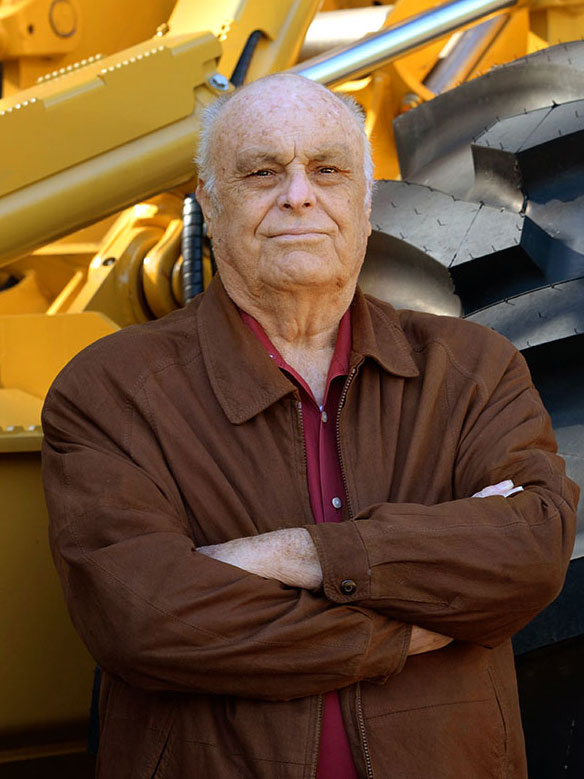
On March 12, 2018, owner and co-founder of B & G Equipment, W.J. Bates, 83, died just two weeks after his wife of 63 years, Carolyn passed. It was an accident, and sad and tragic as it was, one thing that can be said for certain. W.J. passed away doing what he liked to do best – working. He was an active member of his local community of Philadelphia, Mississippi, serving as a Deacon at Bethsaida Baptist Church. And he was prominent in the local forestry industry as a former logger, a B & G co-founder and a board member of the Mississippi Forestry Association.
W.J. and Carolyn leave behind a large and tightly knit cast of characters that have been ned in the business of logging
of their lives. Daughter, Debbie Webb is president of B & G Equipment. Son, Doug Bates is a long-time sales specialist, son-in-law Jeff Lee is corporate parts manager and son-in-law Rodney Kelly is branch manager in Hattiesburg. Grandson, Justin Webb is vice-president. Grandson, Richard Lee works in the accounting department in Philadelphia. Grandson, Matt Bates is the parts manager in Hattiesburg and grandson, Kade Webb is the warranty administrator in Philadelphia.
With four locations in Mississippi and a fifth in Alabama, B & G Equipment is Tigercat’s longest standing dealer and much admired in the industry. The company was founded in 1976 by W.J. and co-founder Donald Grantham, two men with a long history together in the woods.
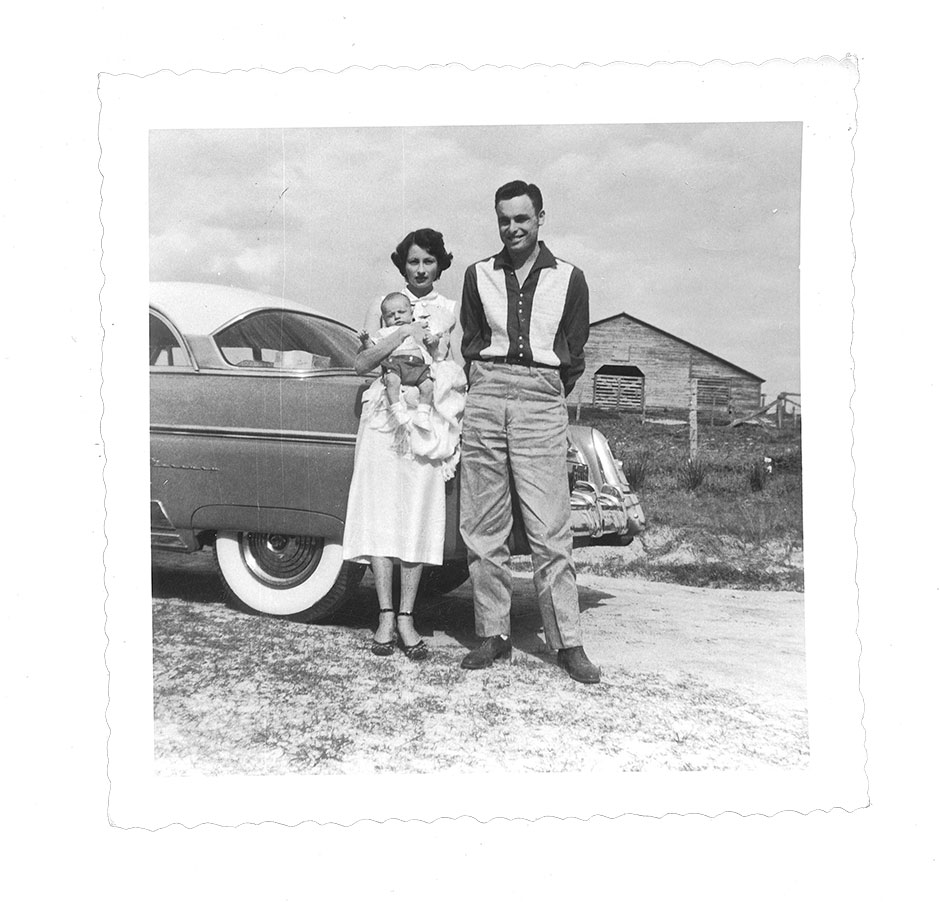
W.J. and Carolyn were married 63 years and passed away within two weeks of one another.
W.J. started out in the industry hauling logs in the late fifties. Long-time friend Jeff Winstead ran a logging business with W.J. later in the sixties. “He hauled for me back in 1964. We still had a bunch of mules back then. He just had the one truck. Then he was logging in Louisiana with Donald Grantham. We started the partnership in 1967 and I bought him out in 1970.”
W.J. and Donald had been logging together in Louisiana since the early 1960s – working on the same job for different companies. “I was 30 and he was 35,” Donald recalls. “I went and did some sawmilling for four years and he went partners with Jeff Winstead and logged for three or four years. Then Jeff bought W.J. out. And then W.J. bought my Daddy out in 1971 and we became partners.”
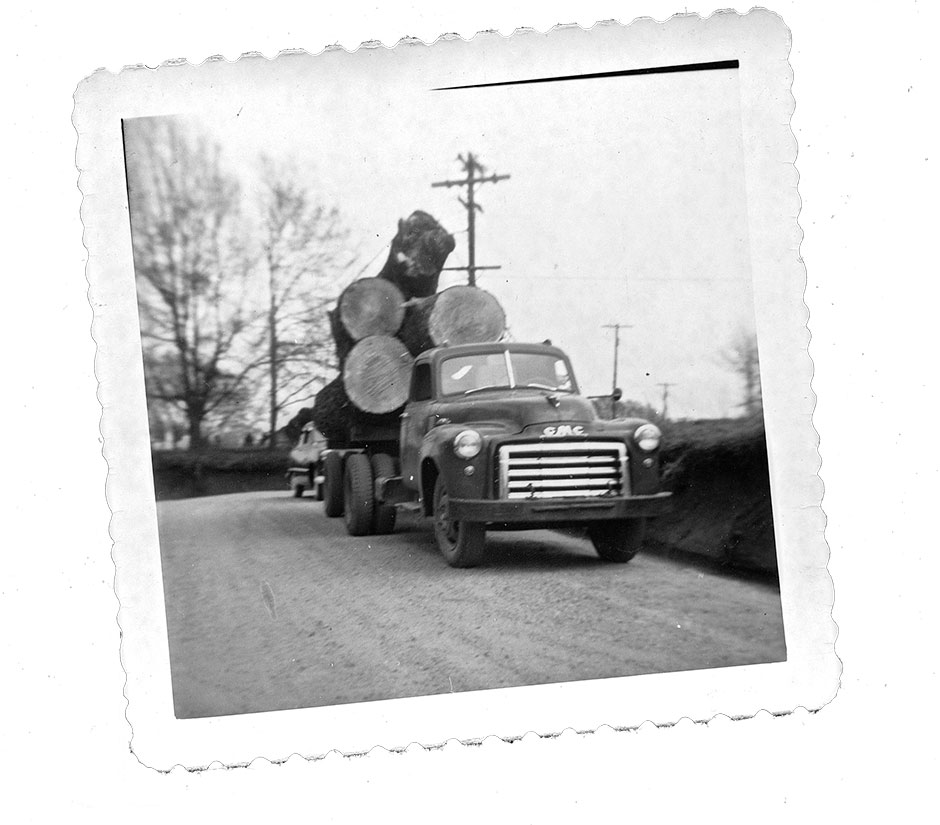
W.J. started his career hauling logs in the late fifies.
When W.J. and Jeff were working together, they ran a pair of Franklin skidders and loaded the logs with a Logger’s Dream, a combined cable loader and yarder. “You would ride the log up the side of the truck,” explains Jeff. “One time we were riding them logs up that cable and that loader was touching that top log. A log dropped and it caught his finger and mashed it. He got on the loader and we finished loading his truck. Then he left to get his finger sewed back on. Then we went back to work.
Another time, a skidder drove over a log and it shifted nearby to where W.J. was working, breaking his leg. He went to the hospital and got his leg pinned back together and two weeks later he was back out there on crutches driving the truck. “He was tough,” Jeff recalls. “It wasn’t all fun but I enjoyed it back then.”
W.J. and Donald ran their logging business until 1978. They worked well together, each tackling a different aspect of the business – Donald looked after trucking and W.J. was in charge of harvesting – but they had a unique relationship.
IT’S GOOD TO HAVE SOMEONE YOU
CAN BE PARTNERS WITH FOR THAT LONG.
– Donald Grantham, B & G Co-founder
“Very seldom would we ride together when we were going to the woods,” Donald explains. “But every once in a while he would ask me to pick him up. If I didn’t say anything, then he wouldn’t say anything. And we would ride 65 miles and not say a word to each other. We would arrive and we’d both get out and go our separate ways for the day and never say a word to each other.”
Donald continues. “He and I always got along and I think because each one of us had a part to play. I could be sitting there working on something in our old shop and he’d go right on by and not even stop. I did him the same way. If he was in the woods working on a skidder, I didn’t bother to help him either. We did things that each other didn’t like but it’s pretty easy to forgive differences when you are making some money. It’s good to have someone you can be partners with for that long.”
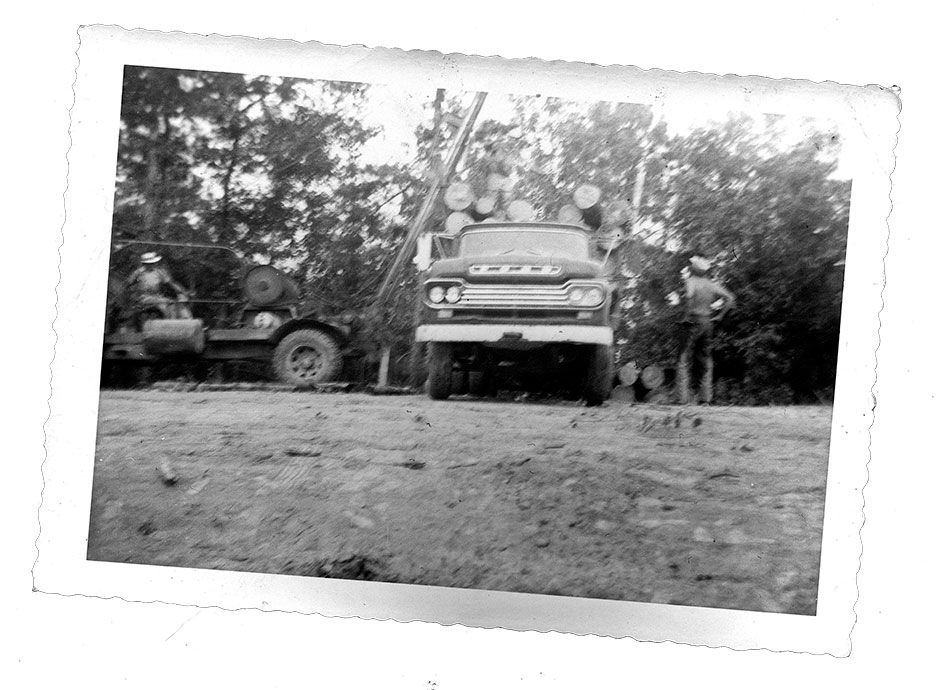
When W.J. and Jeff Winstead were working together, they ran a pair of Franklin skidders and loaded the logs with a Logger’s Dream, a combined cable loader and yarder.
After several years in the logging business, the partners were itching to try something different. “We were pretty good loggers and had got to a pretty good size for our times.” The pair were contracting to Georgia-Pacific at the time. “We were probably producing more than anybody around and the tracts were getting smaller and smaller. We felt like we were always moving and we were sick of it.” So the two men decided they were going to start up
a truck and trailer supply business.
“Debbie was there almost from day one,” remembers Donald. B & G Truck and Trailer Supply opened May 24, 1976 and Debbie started in December. “I remember we were trying to build a new building and they didn’t even have the street put in yet. One of the customers’ wives came in to pay a bill and she was walking ankle deep in red mud. That is how we got started.”
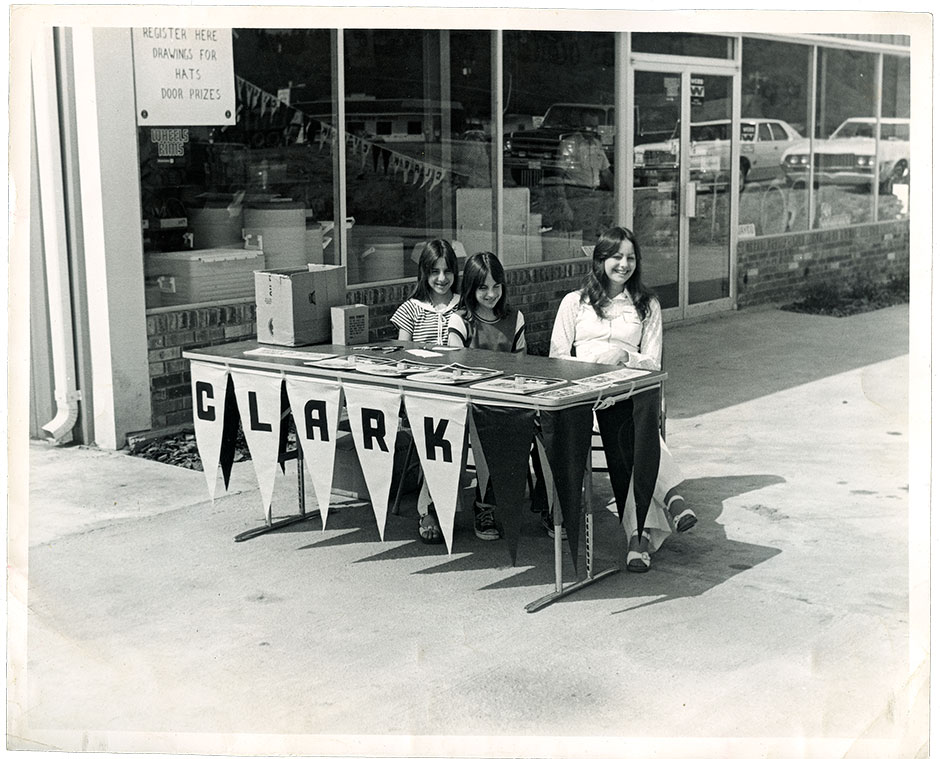
W.J.’s daughter Debbie Webb (right) has been with the company since 1976.
The transition from trailer parts to logging equipment was a combination of good standing in the community, timing and happenstance. “Doug Nunnery from Memphis was managing Tri- State Equipment and they were the Clark dealer at that time.” Donald explains that one day a local logger came into the store and mentioned that he wanted to buy a skidder. Clark had recently cancelled its Mississippi dealer. “And I said, ‘well I have a friend that can help you,’ so I called Doug and he came down and sold it to him. After everything was done he gave W.J. and I $2000. So next time that happened we called Doug.” W.J. and Donald managed to sell a half dozen machines that way.
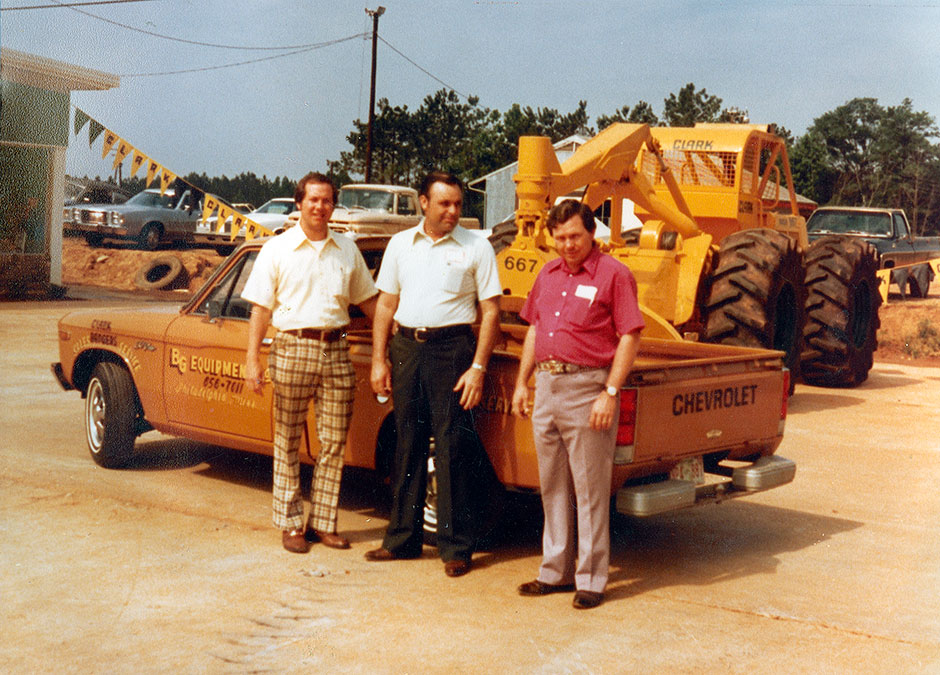
(L-R ): Bill Rogers, W.J. Bates and Donald Grantham in front of a Chevy S10 pick-up, the original B & G service truck.
“Doug kept coming down and selling skidders and one day we said, ‘You know we would like to have that dealership in Mississippi,’ and Doug was on the dealer council back then.” Doug was attending a dealer meeting the following week and promised to put in a word. Not long after, the Clark area manager, Bill Rogers came for a visit and signed them up as a dealer. Donald laughs. “We had to sign a contract that we would quit logging within six months. Maybe they thought we just wanted to buy skidders at cost.”
Just like with the logging business, there was a clear division of responsibilities. Donald did most of the hiring and looked after operations. W.J was the salesman. Don Harden managed parts and Carolyn Bates worked in the office.
“I ran the shop and he did the selling,” says Donald. “And people didn’t think he would be able to sell anything and they said that I should do the selling and he should run the shop. I’ve never sold one piece of equipment.” Donald describes his single attempt at sales as a total failure. “I made a price for a truck mounted loader from an invoice I had pulled. W.J. came in and I told him. ‘What did you charge?’ I told him $12,000. W.J. said. ‘That was our cost and not even the freight!’” In damage control mode, Donald went back to the customer and told him he had to charge sales tax. The customer got upset and cancelled the deal much to his relief.
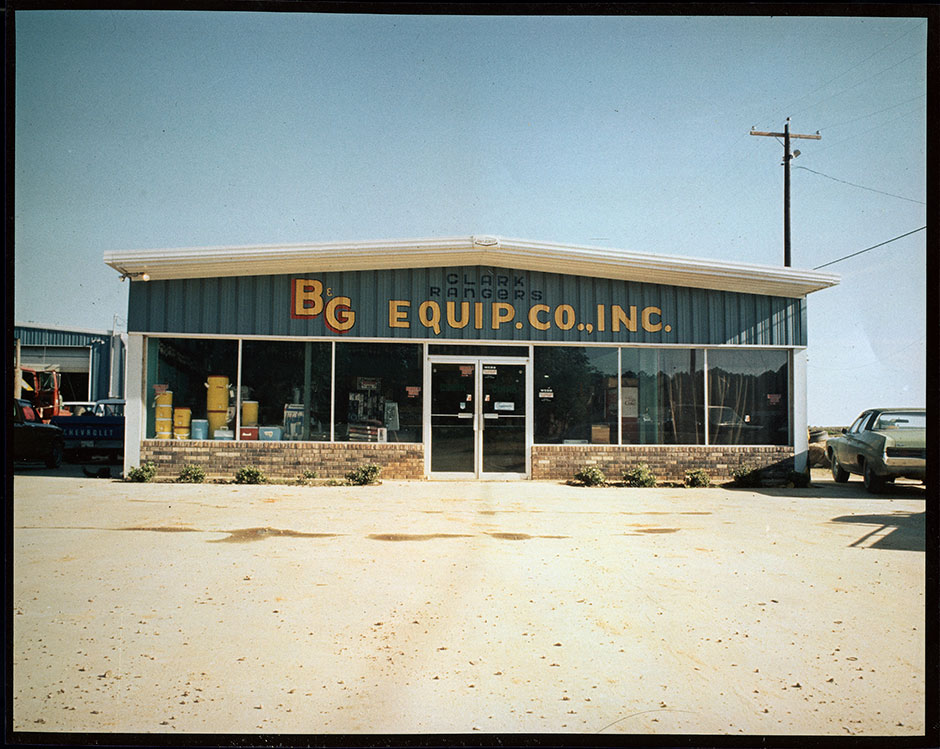
B & G Equipment, Philadelphia, 1977.
By all accounts, W.J. was not an extrovert or a people person. But he was a person that people trusted. Long time friend and customer Allen (Bubba) Eaves tells it this way. “He cared more about you than just your money and he stayed on the same level as his customers. And his price never changed.” W.J. was renowned for never moving on price and he would become irate if one of his salesmen tried to change the price after he had approved a deal. He never apologized for making a profit – it paid for the extremely high level of service that his customers enjoyed. “It was a fair price,” says Bubba. “That builds trust. When a salesman is dropping the price to get the deal… well you can read between the lines.”
Bubba adds, “Sometimes you’d walk in to the store and he’d look at you like he could kill you, but if you needed him and he seen you was trying, he would break his back to help you. He took chances on a lot of people and I know he lost his britches a few times, but he was pretty smart and he knew who he could trust… if he saw good in somebody.”
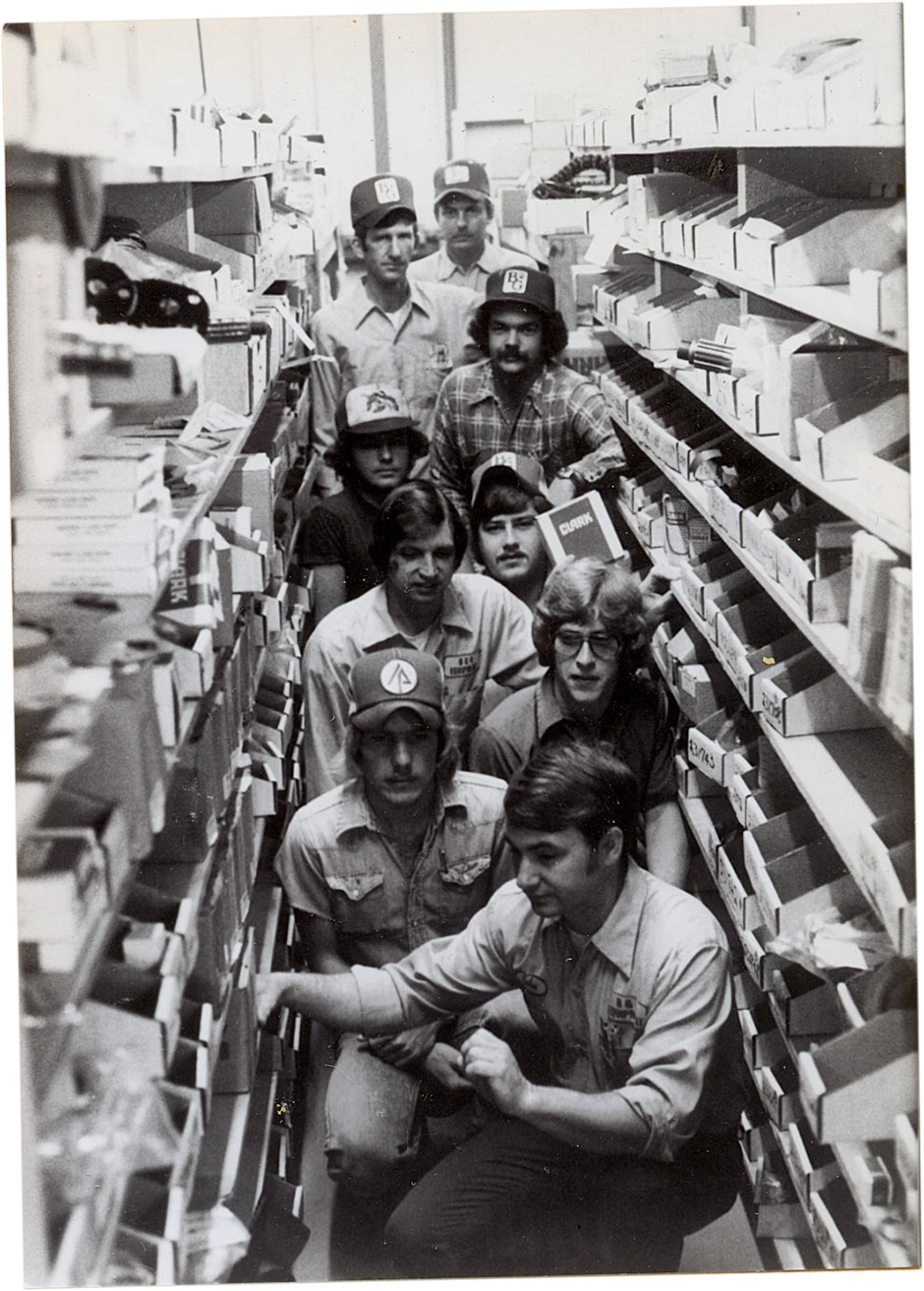
The parts and service team in Philadelphia. Service capability and parts availability were most important to W.J.
Jeff Winstead also has a sales story about W.J. It was during a time when he was demoing a Cat and a Timberjack skidder. “Me and the Cat salesman were sitting out there drinking and the Timberjack guy showed up. I asked him if he wanted a drink, and he said, ‘No, I don’t fool with it.’ I bought the Cat that day. And later, I made a remark to W.J. that I’m not going to buy nothing from someone that won’t have a drink with me. And one day much later, he and Dwight Stokes brought a cutter and a skidder. We were talking and I asked W.J. if he wanted a drink. He said, ‘Yup, I heard you make a remark one time. So fix me one.’ I bought the cutter.”
Willis Jones has been a customer of B & G for 30 years. He remembers in the early days of his logging career that “W.J. was like a daddy to me. I had a raggedy old cable skidder and it got stuck. W.J. brought a brand new grapple skidder to me. He pulled me out and didn’t charge me a dime. You don’t forget those things. Whatever you wanted, whatever you needed, he would work with you any way he could.”
Donald recalls what a typical Saturday morning in the early days looked like. “When we had the
old building, his office was on one side and coffee pot on the other side. On a Saturday morning there would be five or six loggers sitting in the lobby shooting the bull. He would get up out of his office to get a coffee and would walk by everyone and not say a word. Not good morning, nothing. He would go back to his office and sit and drink his coffee and then fifteen minutes later, he would come out of the office again and be talking to everyone. That was just him.”
Charles Martin started with the company in 1978 as a mechanic. He became the shop foreman about twelve years later and retired as service manager just last year. “He might not speak to you for a couple of days but not because he was mad at you. If you needed something, he always had time for you. And if he told you something, you could go to the bank with it,” says Charles.
Debbie never got the impression that it was W.J.’s goal to dominate the state of Mississippi. “I would say the thinking was just do the best they could for service.” Joe Kemp was selling machines further and further to the south and west and B & G needed a location to better service those customers. She remembers that they had a facility in Louisiana for a while. “He and Mom would live there in a trailer for the week and come home for the weekend. But the tax laws were a nightmare in Louisiana, so they moved back into Mississippi in 1984. That was how Magnolia started.”
Meanwhile the product range was growing as well. They picked up Husky loaders, then the Barko loader line. Around 1983 they got the Hydro-Ax feller buncher range followed by Prentice loaders.
“If they told a customer they were going to do something, they did it,” says Debbie. “Dad put service above everything else. He didn’t want to order parts. He wanted all the parts on the shelf.”
Donald concurs. “Back in the day, if you walked in with 100 part numbers for a Clark skidder, we could lay you out 98 of them on the counter. The warehouse only had 88% availability. We shipped parts all over the US for Clark.”
Joe Kemp took over management of the Magnolia store in 1990. It was in the red and although Joe recognized that he needed to hire an additional salesman to support the Prentice Hydro-Ax line in the region, there was not enough in the budget for it. According to Debbie, “They came in and said, ‘Either you hire a salesman or you lose the dealership.’ So B & G kept the Blount line in Philadelphia but lost it in Magnolia.” Joe was very motivated to try something new.
He travelled to the Tifton, Georgia show in 1992 – where Tigercat debuted the prototype 726 – and saw the machine for the first time. He approached Gord Sims, who at that time was the Tigercat representative for all of the United States. Gord set up Magnolia as Tigercat’s first dealer.
W.J. fought against selling Tigercat in Philadelphia and B & G kept the Blount product range in until 2010.
Tigercat district manager for Alabama-Mississippi, Johnny Boyd, admits that for him, it was a challenging time. But the spark that Joe created, along with Johnny’s perseverance and Tigercat’s willingness to quickly ramp up to a full southern US product line, helped to create a truly outstanding dealer-manufacturer partnership that is going on 26 years. The two companies grew together as B & G went on to open the Hattiesburg branch in 1997, Iuka in 2002 and Moundville in 2015. In 2000, Donald bought W.J. out of the wood business that the two men had started in 1979. And in 2005 W.J. bought Donald’s share of B & G Equipment.
Johnny Boyd recalls how Tigercat and B & G changed and evolved together. Dick Ronald, the original US sales manager at Tigercat, and W.J. went way back to the Clark days. “When Justin was coming on, it was the same time that Dick Ronald was transitioning the sales department over to Kevin Selby. I remember that one day something went down, and W.J. said, ‘I don’t think me and this new sales desk is going to get along too good.’ Well you’ve got Dick Ronald and W.J. in one school and Kevin and Justin in another school. So that kind of worked out perfectly.”
W.J. was always worried about growing too quickly and outselling his service. “You lose everything that you gained plus some. If you can’t keep them running, word will get out,” he would say often. As Justin took on more responsibility in the sales arena, he would try to get W.J. to look at market share reports but W.J. wanted no part of it. Market share wasn’t important to him – service and profit were what counted, and the two went hand in hand.
If a recurring issue was discovered on a Tigercat product, he tended to react quickly, cancelling all his orders of the affected model. “There was a problem once and he called up there and cancelled all the orders,” Johnny recalls. “And then a few days later, we got the problem sorted out. He had to call Dick Ronald back and to ask him to reinstate all those orders. And Dick said, ‘I never did cancel them W.J.’ I recall W.J. saying afterward, ‘I think Dick Ronald knows me better than I know myself.’”
It is clear that W.J. was motivated by a love for the forest industry and the outdoors but what were his other interests? More work, it turns out. “He always had a few cows,” says Donald. “Then about 1990, we really got into the cow business. We were running 1,000 head at one time.” However, Donald figures that they bought about all the fun they could afford in the cattle business. “I think in ten years we lost nearly two million dollars.”
Donald’s son Chad agrees that most of W.J.’s fun revolved around finding some type of work to do and then losing himself in it. “Cows and dirt work were his hobbies. He would be bush hogging or working at the dirt pit where the accident happened, or working on a fence. He was always doing something. Once he was digging out a place at the lake, throwing the dirt out, and he dug himself onto an island with water all around him,” Chad recalls laughing.
W.J. liked to spend time in the morning with his breakfast group – a close knit bunch that liked to get together because they had common interests in cows, moving dirt, logging and trucking. Chad explains it best. “We had a local diner here and from the time I was born, that is where everyone went. Dot’s Café. When Dot’s closed down, they moved on to another place. They were such a bunch of tight wads that they would put each restaurant out of business, hunting for their three dollar breakfast.”
Donald adds some perspective on the topic of frugality. “His Daddy used to tell on him when we were logging in Louisiana. Papa Bates used to say if he was thirsty, he’d walk all the way home and have a glass of water rather than pay a nickel on a bottle of Coke.”
“But he bought it if a lady came in,” interjects Charles. “He once came into the shop telling me how great this fuel saver was that a woman sold to him. He said he wanted it on everything he had. Then the next day he came in telling us how much better his vehicle was running and how much smoother. He said, ‘I told my breakfast bunch about it and they all want one.’ We had been really busy the day before and I hated to tell him that we just hadn’t had the time to put it on.”
“Dad didn’t go on vacation,” says Debbie. “We have very few memories of when he went to the beach with us, but as he got older, him and Mama started to go.” Justin recalls a time that his grandparents were planning a trip to the mountains in the motorhome. W.J. got it into his head that he just didn’t want to go. “Me and Johnny Burton were in his office and he said, ‘You all watch this. I am going to show you how to handle a woman, OK. Hey Old Woman, come in here.’ He took a thousand dollars out of his pocket and said ‘I don’t want to go on this trip. We can go or you can have this money and we’ll stay home.’ She said, ‘Alright, we’ll stay,’ and she grabbed the money. And then she headed to the door and started laughing. He said, ‘What are you laughing about?’ And she answered, ‘I just told Debbie that I didn’t really feel like going anyway.’ I thought Johnny Burton was going to fall on the floor laughing.”
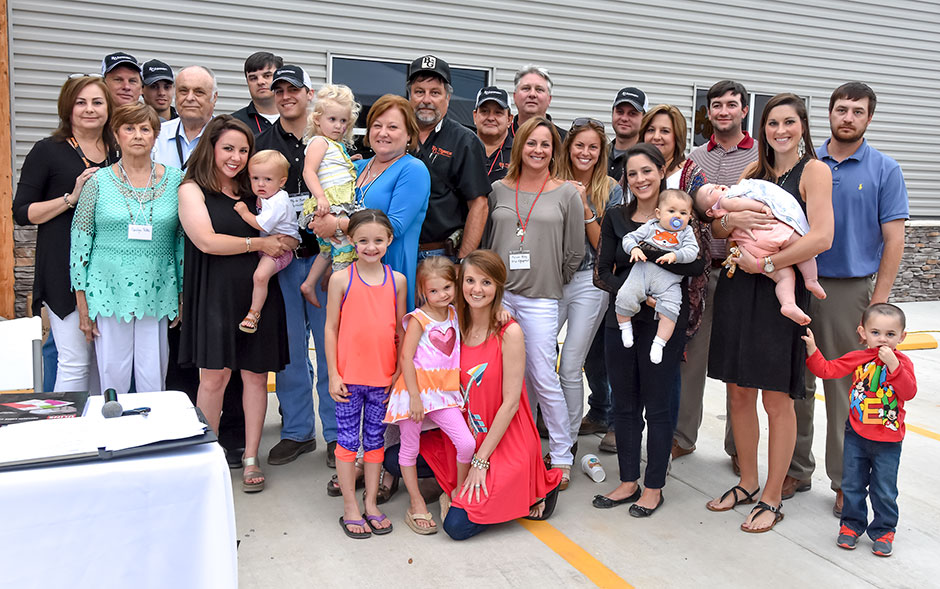
The future – four generations of the Bates family. Up until W.J. died, three generations were working in the business.
W.J. and Carolyn took each of the grandchildren on trips, one at a time. Justin recalls the year it was his turn. W.J. had a brand new Cadillac. “We got to the hotel and I love to swim and they wouldn’t let me go swimming because we were going to eat somewhere. I threw a fit. Then I left a box of crayons in the back window.” Of course they melted into that lux Cadillac interior. Another year, they made the mistake of taking two grandchildren, Kade and Hannah. Although they were cousins, they fought like siblings. “I think that ended the grandchild trips,” Debbie surmises.
Justin’s father, Stan Webb was more of a city boy. “I wasn’t around much equipment and logging and country stuff. So I met Debbie and I got around the family and this family is nothing but that. W.J. had a soft spot for people who wanted to work and he expected his family to work.” All nine of W.J.’s grandchildren have college degrees. “His generation and even his kids’ generation, it wasn’t like that. They just worked. But his grandkids having the education and the work ethic, he was very proud of that.”
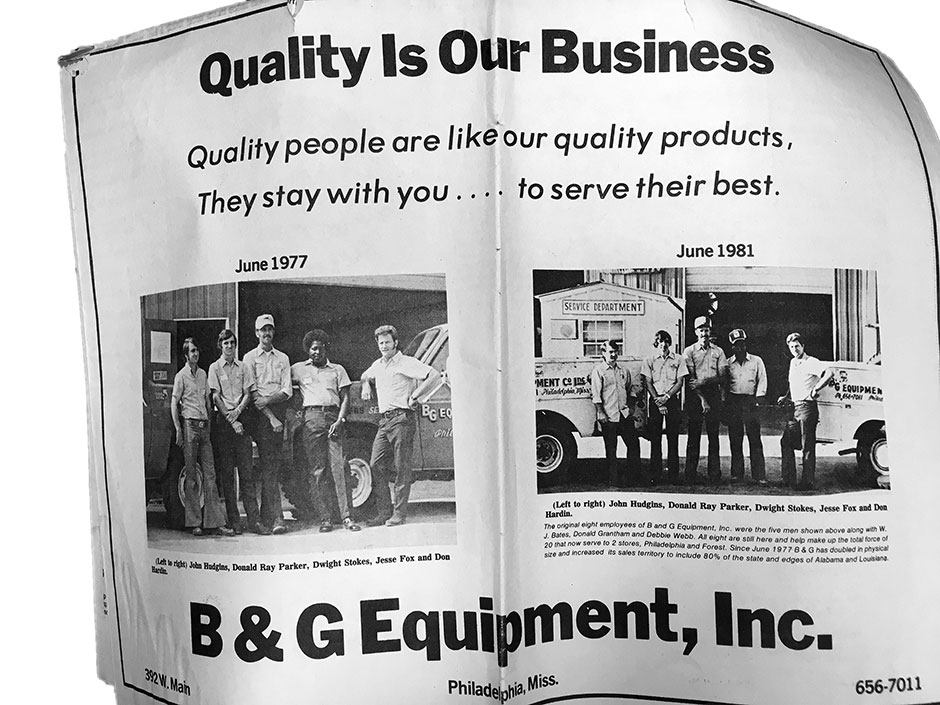
The service team. (L-R) John Hudgins, Donald Ray Parker, Dwight Stokes, Jesse Fox and Don Hardin. Debbie says that they always stood in the same order for the pictures that appeared in advertisements.
W.J. began to step away from the day-to-day management of the business around five years ago, handing over progressively more decision-making responsibilities to the next generation. However, he read a report every morning from each branch location, summarizing what was happening that day. Then he would call and discuss any questions he had with the store managers. “He would get his report from Debbie and myself in person,” says Justin. “He had done this for as long as I can remember.” A few months before the accident he told Debbie that he didn’t need to see the reports anymore. He said that if he wanted to know something, he would ask. “It was being run exactly how he had trained everyone. He didn’t brag much on anyone but when he told her that it made us feel really good,” says Justin.
“In the later years as he got out of this business, I started calling him Kingpin,” says Stan. “He wasn’t necessarily hands-on but he had the final say and I’m sure that all of them miss that, because it’s a whole lot better when you can have someone to bounce things off of. And since the tragedy, it has been really interesting to watch the family. To lose both of your parents in two weeks and you wake up the next day and things have to happen. They’ve done well.”
A lot that people didn’t know about came out at the funeral in the stories that were told. Some of the B & G employees talked about how he had helped them or given them a second chance. And when Katrina hit in 2005, W.J. sent truckloads of household items, generators and a pile of cash to look after the basic needs of the families of all the employees in Hattiesburg.
He donated funds to his church and the local hospital. And equally important, he guided those around him and helped many people to help themselves. “When you looked at him, you didn’t really think of him as a community man,” explains Debbie. “But if the church needed anything, if there was dirt work, or a tree that needed to come down, he was there. If someone needed something, he was there to help, but he didn’t talk about it. He just did it.”
Charles recalls a time when W.J. was grinding out a stump at the church a year before he died. “It was with one of those fancy remote controlled stump grinders and he was sitting in a chair, and he fell asleep and fell out of the chair. The preacher had a good laugh at that.”
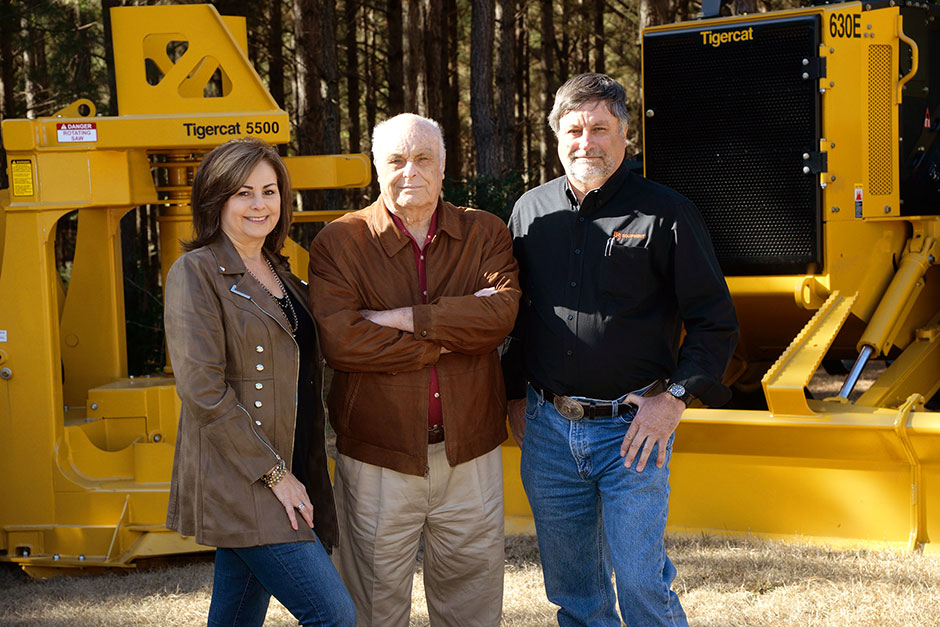
Debbie Webb, president of B & G and daughter to W.J., W.J. Bates, co-founder of B & G, and Doug Bates, B & G salesman and son to W.J.
Mr. W.J. Bates was a walking contradiction. Multiple people described him in the same breath as both stingy and the most generous man they ever met. His friends, neighbours and employees often could not pry a word out of him, but he guided, mentored and offered sage advice to those around him countless times. He was fair and honest. His high regard and concern for the well-being of others helped to build a strong, successful business and in no small way helped to build the community around him as well. W.J. Bates touched many lives in meaningful and often comedic ways. As everyone says with genuine warmth and emotion, he will be missed.